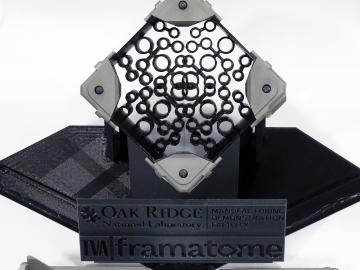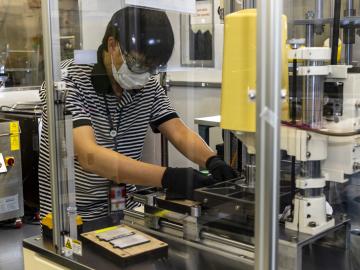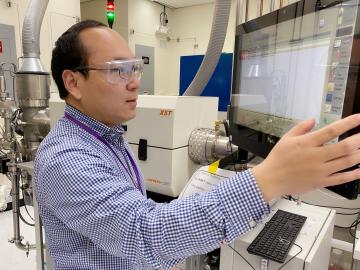
Filter News
Area of Research
News Type
News Topics
- (-) Advanced Reactors (6)
- (-) Cybersecurity (3)
- (-) Environment (17)
- (-) Grid (3)
- (-) Isotopes (5)
- (-) Materials Science (19)
- (-) Quantum Science (8)
- (-) Security (2)
- 3-D Printing/Advanced Manufacturing (18)
- Artificial Intelligence (6)
- Big Data (10)
- Bioenergy (8)
- Biology (5)
- Biomedical (12)
- Biotechnology (1)
- Chemical Sciences (4)
- Clean Water (2)
- Computer Science (27)
- Coronavirus (14)
- Energy Storage (10)
- Exascale Computing (3)
- Fusion (11)
- High-Performance Computing (2)
- Machine Learning (3)
- Materials (2)
- Mathematics (2)
- Mercury (1)
- Microscopy (4)
- Molten Salt (1)
- Nanotechnology (9)
- National Security (2)
- Neutron Science (20)
- Nuclear Energy (21)
- Physics (11)
- Polymers (2)
- Space Exploration (1)
- Summit (7)
- Transportation (7)
Media Contacts
A collaboration between the ORNL and a Florida-based medical device manufacturer has led to the addition of 500 jobs in the Miami area to support the mass production of N95 respirator masks.

New capabilities and equipment recently installed at the Department of Energy’s Oak Ridge National Laboratory are bringing a creek right into the lab to advance understanding of mercury pollution and accelerate solutions.

The Transformational Challenge Reactor, or TCR, a microreactor built using 3D printing and other new advanced technologies, could be operational by 2024.

Popular wisdom holds tall, fast-growing trees are best for biomass, but new research by two U.S. Department of Energy national laboratories reveals that is only part of the equation.

Two scientists with the Department of Energy’s Oak Ridge National Laboratory have been elected fellows of the American Physical Society.

Soteria Battery Innovation Group has exclusively licensed and optioned a technology developed by Oak Ridge National Laboratory designed to eliminate thermal runaway in lithium ion batteries due to mechanical damage.

Four research teams from the Department of Energy’s Oak Ridge National Laboratory and their technologies have received 2020 R&D 100 Awards.

About 60 years ago, scientists discovered that a certain rare earth metal-hydrogen mixture, yttrium, could be the ideal moderator to go inside small, gas-cooled nuclear reactors.

Scientists at ORNL and the University of Nebraska have developed an easier way to generate electrons for nanoscale imaging and sensing, providing a useful new tool for material science, bioimaging and fundamental quantum research.

Kübra Yeter-Aydeniz, a postdoctoral researcher, was recently named the Turkish Women in Science group’s “Scientist of the Week.”


